Politics
Asian markets rise ahead of US election, Chinese stimulus meeting
Published
5 months agoon
By
Ekwutos BlogAsian markets rise ahead of US election, Chinese stimulus meeting
Asian markets rose Monday as investors steel themselves for a too-close-to-call US presidential election, while Chinese leaders meet to hammer out a stimulus package that experts say could be determined by the vote.
The gains came after a positive lead from Wall Street and data showing far fewer US jobs were created last month than expected, boosting hopes for a Federal Reserve interest rate cut when it gathers this week.
With Democratic Vice President Kamala Harris and her Republican rival Donald Trump neck and neck ahead of Tuesday’s poll, traders are keeping a close eye on any hint of an advantage either way.
The dollar slipped Monday as a fresh opinion poll in Iowa — which Trump won in 2016 and 2020 — showed Harris leading.
A victory for Trump is seen as being positive for the dollar and pushing up Treasury yields owing to his pledges to cut taxes and impose hefty tariffs on imports.
Elections for the Senate and House of Representatives are also being closely watched amid speculation the Republicans could take control of both.
“It’s not just about who wins the presidency but also the composition of the House and Senate,” said Peter Esho, founder of Esho Capital.
“If the Republicans sweep all three, that will open the door to significant fiscal changes, which is negative for bondholders and could spell higher yields until the dust settles.”
The election comes days before the Fed is due to make its latest policy decision, with investors expecting 25-basis-point reduction after a bumper 50-point cut at its last gathering.
The vote is of particular interest to China, where Beijing is this week meeting to hammer out an economic stimulus.
The concrete measures are expected to be announced Friday, allowing time for officials to digest the result and make allowances for either.
“We believe the US election results will have some impact on the size of Beijing’s stimulus package,” said Ting Lu, Nomura’s Chief China Economist, in a research note.
Both candidates in the race have pledged to get tougher on Beijing, with Trump promising tariffs of 60 percent on all Chinese goods coming into the country.
“We are expecting more details on the proposals to be passed,” said Heron Lim of Moody’s Analytics, including “how this extra funding would be allocated to address the near-term economic issues”.
Nomura economists expect lawmakers this week to approve around a trillion yuan ($140 billion) in extra budget — mostly for indebted local governments.
Observers also expect Beijing to approve a one-off one trillion yuan for banks, aimed at writing off non-performing loans over the past four years.
Markets rose across Asia, with Hong Kong and Shanghai among the best performers, while Sydney, Seoul, Singapore, Taipei, Wellington and Jakarta were also well up.
Oil prices rose more than one percent after eight members of the OPEC+ group of producers said Sunday they would extend supply cuts until the end of next month.
They had been delaying output hikes on worries about slowing demand in China and the United States.
The commodity was also being supported by geopolitical tensions after Iran’s supreme leader Ayatollah Ali Khamenei warned at the weekend that Israel and the United States “will definitely receive a tooth-breaking response” to Israeli attacks on October 26.
That strike was in response to an October 1 barrage of about 200 missiles against its rival.
Key figures around 0230 GMT
Hong Kong – Hang Seng Index: UP 0.2 percent at 20,546.35
Shanghai – Composite: UP 0.3 percent at 3,282.42
Tokyo – Nikkei 225: Closed for a holiday
Euro/dollar: UP at $1.0888 from $1.0833 on Friday
Pound/dollar: UP at $1.2975 from $1.2917
Dollar/yen: DOWN at 151.79 yen from 153.01 yen
Euro/pound: UP at 83.92 from 83.86 pence
West Texas Intermediate: UP 1.5 percent at $70.50 per barrel
Brent North Sea Crude: UP 1.4 percent at $74.09 per barrel
New York – Dow: UP 0.7 percent at 42,052.19 (close)
London – FTSE 100: UP 0.8 percent at 8,177.15 (close)
You may like


500K deposit: Man who lost his pregnant wife responds after Reuben Abati, blasted him.
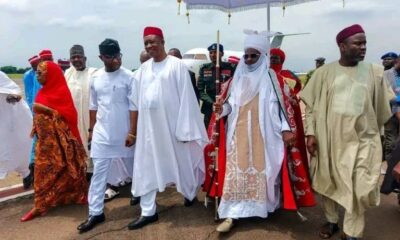

Kano deputy gov reports back after peace-building mission in Edo
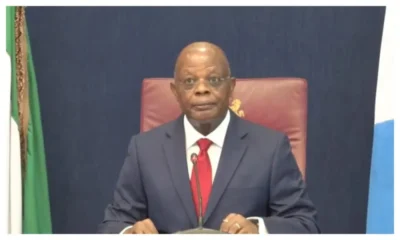

Despite criticism, Ibas swears in sole administrators for Rivers LGAs


Kano lawyer petitions Tinubu over ‘politically motivated’ police invitation of Emir Sanusi
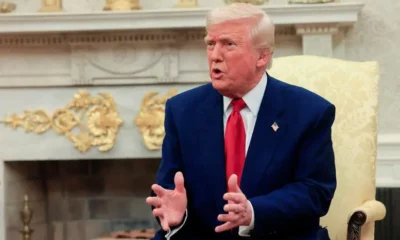

U.S withdraws military aid from Niger, redirects to Côte d’Ivoire, Benin, Ghana
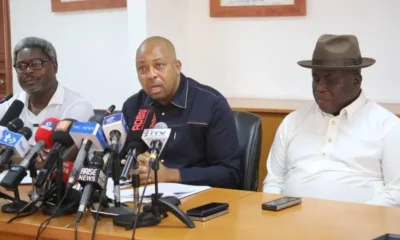

FCT Minister rolls out major land administration reforms, introduces strict timelines for allottees
Politics
Kano deputy gov reports back after peace-building mission in Edo
Published
5 hours agoon
April 11, 2025By
Ekwutos Blog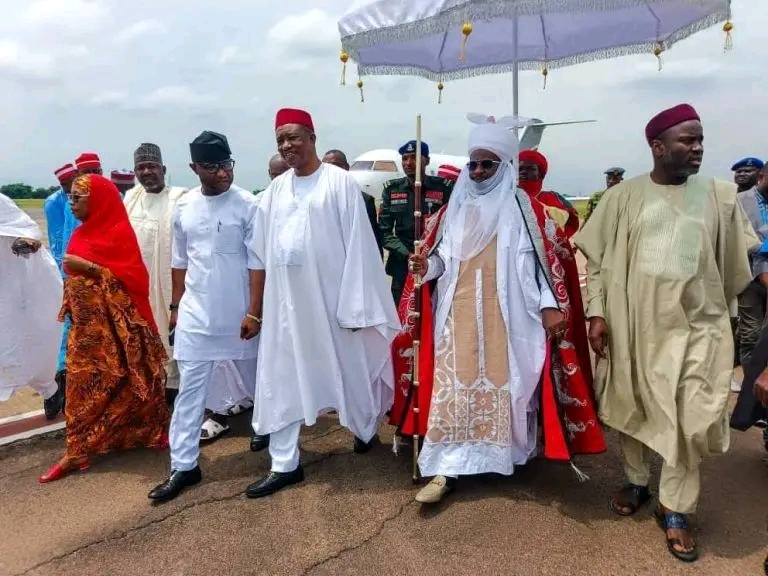
The Deputy Governor of Kano State, Aminu Abdussalam Gwarzo, has reassured northerners living in Edo State about their safety, following the recent violence that led to the deaths of several Kano indigenes.
Ekwutosblog recalls that Gwarzo led a high-powered delegation to the South-South state. The delegation included the Emir of Rano, Ambassador Muhammad Isa Umar, four commissioners, the Chairman of Bunkure Local Government (the area most affected by the incident), and the representative of the Edo community in Kano.
Speaking to journalists in Kano, Gwarzo revealed that the visit followed an earlier condolence mission by Governor Monday Okpebholo to the Torankawa Community in Bunkure Local Government Area of Kano, where seven of the victims hailed from.
Gwarzo noted that the delegation visited the scene of the incident in Uromi, Edo State, where they were warmly received by both political and traditional leaders.
He described the reception as overwhelming, with a massive crowd, largely consisting of northerners, showing solidarity and appreciation.
“We met with the king of Uromi Kingdom and his senior chiefs. The Edo State governor personally accompanied us to the scene. It was a long journey nearly two hours from Benin but the turnout was incredible,” he said.
He commended the Edo State leadership for its proactive actions, including the disbandment of the vigilante group allegedly involved in the killings, the arrest of 14 suspects, and ongoing efforts by security agencies to apprehend those still at large.
“The Commissioner of Police in Edo State was transferred due to the incident, which shows the seriousness with which the state government is handling the situation,” the deputy governor stated.
He further disclosed that Kano had compiled a comprehensive report, documenting the victims and the extent of losses suffered, including properties destroyed.
He said the report has been formally submitted to Governor Okpebholo, who promised compensation for the victims and their families.
Gwarzo emphasized that justice remains the core demand from the Kano State Government and reiterated the constitutional right of every Nigerian to live and work peacefully in any part of the country.
“Nigeria belongs to all of us. The constitution guarantees every citizen the right to reside and earn a living anywhere in the country.”
“The governor of Edo has assured us that those responsible will be brought to book and that compensation will be provided. He made it clear that there is no animosity toward northerners in Edo. From what we witnessed, I can confidently say our people are very safe there,” he said.
He also confirmed that 26 individuals survived the attack, primarily from five local government areas in Kano.
Politics
Atiku, El-Rufai, Tambuwal visit Buhari in Kaduna
Published
6 hours agoon
April 11, 2025By
Ekwutos Blog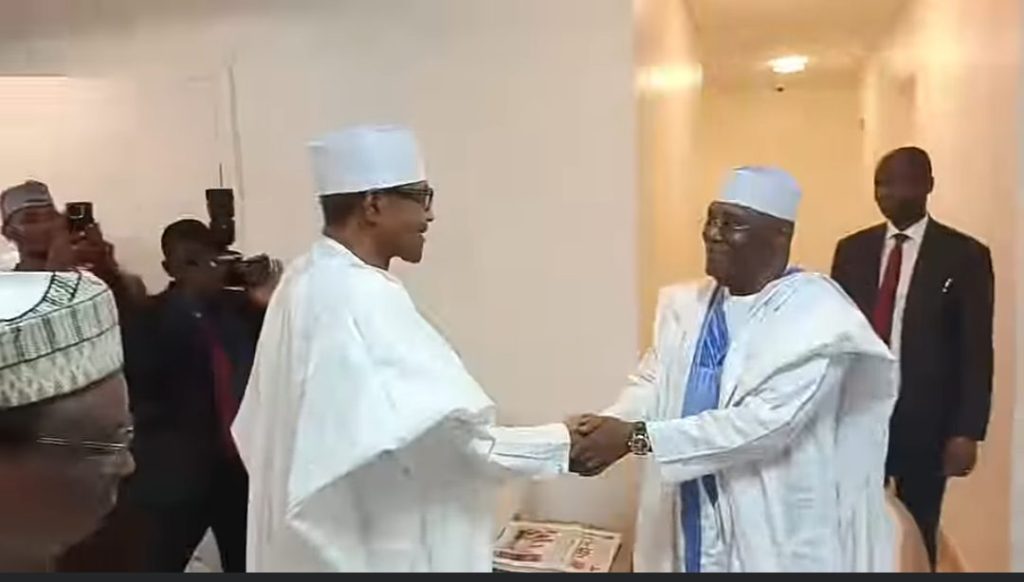
Former Vice President and 2023 PDP presidential candidate, Atiku Abubakar, has visited former President Muhammadu Buhari at his residence in Kaduna.
The visit, which also included former governors Aminu Waziri Tambuwal (Sokoto) and Nasir El-Rufa’i (Kaduna), was captured in a video sighted on the Facebook page of Atiku Abubakar.
Although the specific purpose of the visit was not disclosed, Atiku described it as a “post-Sallah visit.”
In the post, Atiku wrote, “As the Waziri Adamawa, I was obligated to be in Adamawa during the Sallah celebrations. I held forth for the Lamido Fombina (Adamawa) in some of the activities of the Sallah celebrations. Today, I had the opportunity to pay a post-Sallah visit to His Excellency, Muhammadu Buhari, President of the Federal Republic of Nigeria, 2015-2023. It was a wonderful time with him. As usual, he cracked me up (to the extent that my ribs were hurting) with his peculiar humour. -AA”
The visit comes after governors from the All Progressives Congress (APC) paid a similar visit to Buhari in Kaduna last week, amid growing speculation about political realignments and possible coalitions ahead of the 2027 elections.
Politics
Rivers govt debunks civil service recruitment announcement
Published
6 hours agoon
April 11, 2025By
Ekwutos Blog
Rivers State Government has refuted a widely circulated social media announcement alleging that the state’s Sole Administrator, retired Vice Admiral Ibok-Ete Ekwe Ibas, approved the recruitment of 10,000 “graduates and non-graduates” into the Rivers State civil service.
On Thursday, social media platform “Facebook”, was flooded with the purported government notice, which falsely claimed that the recruitment exercise had been sanctioned.
The statement was reported to have been signed by the Secretary to the State Government, Professor Ibibia Lucky Worika.
However, in a statement issued by Mrs. Inyingi S. I. Brown, Acting Head of the Rivers State Civil Service, the government described the information as entirely untrue and urged the public to disregard it.
The statement also clarified that any official communication on civil service recruitment would come from the Rivers State Civil Service Commission at the appropriate time.
The statement read, “The Office of the Administrator of Rivers State wishes to disclaim a purported Special Government Announcement spreading round on social media and other platforms stating that His Excellency, The Administrator of Rivers State, Vice Admiral (Rtd) Ibok-Ete Ekwe Ibas CFR, has approved the recruitment of 10,000 qualified graduates and non graduates into the Rivers State civil service and that the recruitment portal shall be opened for application midnight of Sunday 13/04/2025.
“The statement is claimed to have been signed by the Secretary to the State Government, Professor Ibibia Lucky Worika.
“We wish to categorically inform the people of Rivers State and the general public that this is false and ask that this fake announcement be ignored.
“Appropriate information will be released by the Rivers State Civil Service Commission in due time.”

500K deposit: Man who lost his pregnant wife responds after Reuben Abati, blasted him.

Kano deputy gov reports back after peace-building mission in Edo

Despite criticism, Ibas swears in sole administrators for Rivers LGAs
Trending

 Trending6 months ago
Trending6 months agoNYA demands release of ‘abducted’ Imo chairman, preaches good governance
- Business6 months ago
US court acquits Air Peace boss, slams Mayfield $4000 fine

 Politics6 months ago
Politics6 months agoMexico’s new president causes concern just weeks before the US elections
- Entertainment6 months ago
Bobrisky transferred from Immigration to FCID, spends night behind bars
- Entertainment6 months ago
Bobrisky falls ill in police custody, rushed to hospital

 Politics6 months ago
Politics6 months agoRussia bans imports of agro-products from Kazakhstan after refusal to join BRICS

 Politics6 months ago
Politics6 months agoPutin invites 20 world leaders
- Politics1 year ago
Nigerian Senate passes Bill seeking the establishment of the South East Development Commission.

